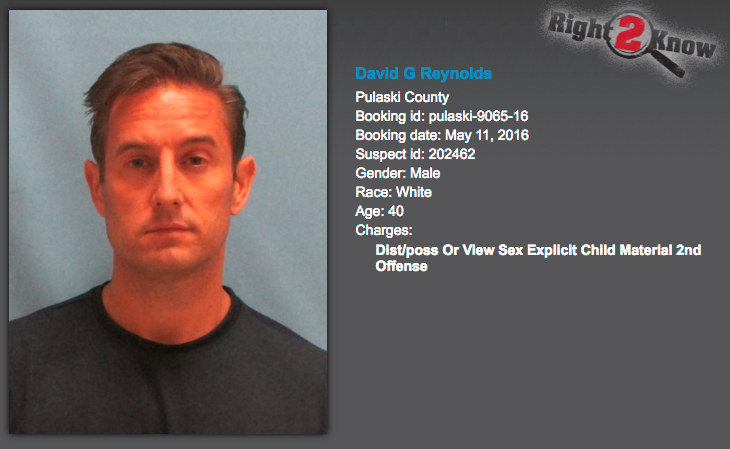A former Sherwood pastor accused of being involved with child pornography is arguing that investigators overstepped their bounds by searching his cellphone and by questioning him before reading him his rights.
David Glynn Reynolds, 41, is charged with 30 counts of possessing, distributing or viewing matter depicting sexually explicit conduct involving a child. Each charge is a Class C felony that carries up to 10 years in prison.
The married father of two was arrested in May 2016 after Sherwood police, acting on a complaint from the Twitter social media site, were able to link his Internet service account at the family's now-former Miramonte Drive home to two Twitter accounts that had been trafficking in questionable images, according to police testimony at a Wednesday hearing.
Reynolds has denied any involvement with illegal photographs and told police he did not have a Twitter account. He did not testify during the two-hour hearing.
A search of his phone by examiners at the Arkansas attorney general's office was able to find evidence that his phone had accessed the two Twitter accounts, sweettoothcandy3 and EthanlovesTS, but did not find any illegal images on the device, according to testimony Wednesday.
Reynolds had been a pastor at Cornerstone Bible Fellowship for about six years. He was relieved of his duties at the Warden Road church three days before his arrest after acknowledging to two church elders that he had been involved with pornography, although he denied involvement with child pornography, the church said in a statement released after his arrest.
Pulaski County Circuit Judge Herb Wright said he'll decide whether Reynolds' rights were violated after prosecutors and defense attorneys submit written arguments on the issue over the next three weeks. The judge said he also will decide on a prosecution motion asking that Reynolds be forced to surrender an electronic duplicate of the contents of his iPhone 6, which was seized by police during a March 3, 2016, search of his home.
Defense attorneys Blake Hendrix and Ann Depper argued that officers were wrong to question Reynolds about his use of the social media service before reading the defendant his constitutional rights.
The questioning came during that March 2016 search. Investigators went through his home looking for any devices that could connect to the Internet and Twitter.
Reynolds subsequently submitted to a formal interview in which he acknowledged looking at explicit materials, but denied any of them involved children, court filings show.
The defense also disputes that police had the authority to search the phone itself. The search-and-seizure warrant police obtained from Sherwood District Judge Milas "Butch" Hale allowed police only to take the phone, not examine its contents, Hendrix said.
Reynolds surrendered the device at the request of police, unlocking it so investigators could duplicate its electronic contents. The defense suggested that Reynolds had been coerced into cooperating with investigators.
Chris Cone, a special agent for the attorney general's cybercrimes unit, told the judge he extracted a limited duplicate of the phone's memory while police were searching Reynolds' home.
An abbreviated examination of the electronic data taken from the phone showed no link to the Twitter accounts, so investigators returned Reynolds' phone to him, Cone said. There was no Twitter application on the phone, he said. Those early findings initially caused police to believe someone else was responsible for the Twitter images, Cone said.
But a more thorough review of data, conducted within an hour of police returning the phone, indicated that the phone had been in contact with the Twitter accounts, Cone said.
He testified that a more in-depth examination of the phone's contents could turn up more evidence of Twitter use, either through a phone application or by the social media service's website.
Detective Frank Spence testified that he found 70 illegal images among the 147 pictures, 21 of them in the form of tweets, supplied by Twitter.
The social media service provided the materials to the National Center for Missing and Exploited Children in Virginia, which relayed them to the Arkansas Internet Crimes Against Children Task Force, which turned them over to Sherwood police, Spence said.
Questioned by Assistant Attorney General Jill Irwin, Spence said he hadn't done anything wrong in talking to Reynolds. Spence told the judge that Reynolds was never in custody during the March 2016 search and that he had told Reynolds several times that Reynolds was not under arrest and could leave the home at any time.
Metro on 07/06/2017

